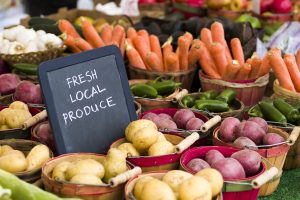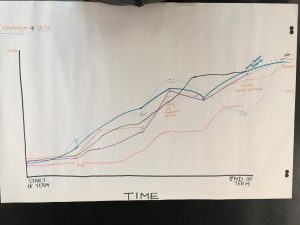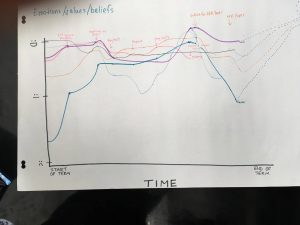Graceful Dismount
“All successful people, men and women, are big dreamers. They imagine what their future could be, ideal in every respect, and then they work every day toward their distant vision, that goal or purpose.”
― Brian Tracy, Personal Success
The goal of our project is to create a framework on which a self-sustaining system that redistributes leftover produce from local farmers markets to community organizations that provide support for marginalized communities can be built. You can find more detailed information about the project in our “Proposal, Objectives, & Achievements” blog post. We’re nearing the end of our part in this project, as we’ve reached out to farmers and the Dr. Peter Center and are entering the data collection and analysis phase of the project. The following outlines our most recent progress, reflections on our work thus far, and our game plan for the final month of the project.

Image from https://www.google.ca/url?sa=i&rct=j&q=&esrc=s&source=images&cd=&ved=0ahUKEwj065S0hrnQAhViVWMKHfLeCXEQjxwIAw&url=http%3A%2F%2Fwww.atlascorps.org%2Fblog%2F%3Ftag%3Dfarmers-market&psig=AFQjCNE0wyLM9NeQN4DL_Xa_Pmc8wiK2Eg&ust=1479790242684858
WEEKLY ACHIEVEMENTS AND OBJECTIVES
Achievements since Oct. 9th:
Oct. 17 – Oct. 23
- Met with farmers at markets and held phone conversations
- Added interest and contact information to our farmers database
Oct. 24 – Oct. 30
- Created survey for farmers
- Set up meeting with Dr. Peter Center’s Dietitian
- Sent questions out to Dietitian
Oct. 31 – Nov. 6:
- Achieved 100% on Blog Post 2
Objectives:
Nov. 7 – Nov. 13
- Meeting with Dr. Peter Center’s Dietitian, Tue. Nov. 8th
Nov. 14 – 20
- Potentially revise farmers’ survey to reflect new information from Dr. Peter Center
- Send out farmer survey
- Begin developing presentation and infographic and drafting final report
Nov. 21 – 27
- Finalize presentation & infographic and submit (submit to Connect Nov. 27)
- Focus on final report
Nov. 28 – Dec. 4
- Finalize and submit final report (submit to Connect Dec. 4)
REFLECTION ON THE MOMENT OF SIGNIFICANT CHANGE WORKSHOP
“It takes but one person, one moment, one conviction, to start a ripple of change.”
– Donna Brazile
WHAT:
The Moment of Significant Change Workshop was a chance for our group to openly discuss how the LFS 350 project has affected us over the term thus far with regard to our Skills & Knowledge and what impact it has had on our beliefs, values, and emotional health. We first created individual graphs (not shown) that tracked our practical and emotional development over the term. We then shared these graphs with our group and explained why the graphs progressed as they did within the context of other events going on in our lives outside of LFS 350. We then created large graphs (see below) and plotted our development over the term collectively in order to better compare our experiences. A common theme that presented itself early in our values/emotions/beliefs graphs was that we all felt excited about and grateful for how fantastic our group is, and it gave us a great source of motivation and forward momentum. We are all genuinely interested in this project and want to see it succeed and we all have high standards which has helped us to excel throughout the term. On top of this, the meeting with Josh was another high point that increased our motivation and clarified our purpose further. Assignments, deadlines, and midterms have taken their toll on our morale and mildly dampered our spirits, but we’ve pushed through and done well on assignments and continue to stay motivated.
SO WHAT:
Despite that we all collectively felt good about our group and the meeting with Josh, this exercise helped us to realize that classwork and life outside of LFS 350 has affected each of us. The workshop was significant because it informed our understanding everyone’s personal struggles and the challenges we’ve faced individually throughout the term. We’ve all experienced setbacks over the past two months, which has undoubtedly affected each of us personally in one way or another. At times, each of us has felt overwhelmed while trying to balance workloads imposed on us by our academics and jobs or faced with the difficulty of dealing with personal matters. Fortunately, we have a strong group and these challenges have not affected the group as a whole – If we were working individually on a project of this scale, it may have been thrown seriously awry due to external circumstances. Luckily, we have a strong group and are able to count on one another, which has enabled us to continue to push forward with the project despite personal setbacks. Dan Barber’s reflections in This American Life (2011) on the difficulty of not having projects unfold as originally proposed, despite having the best intentions, is a good reminder of how fortunate we are as a group. Barber fails multiple times when he tries implementing change. This helps to generate acceptance regarding the fact that struggles occur, and in fact they are bound to occur, and that we should not be afraid when they do occur.
This workshop also helped us establish common ground regarding how we feel about the project thus far and determine how we wish to proceed from an emotional and intellectual standpoint. We all feel that this work is fulfilling: someone from the community will benefit from the project’s framework. We understand that projects do not always unfold, but this mutual feeling of social justice began a group discussion on what this project could do and how much of a missed opportunity it would be for the community if it is not implemented. We all wanted to finish the term feeling motivated, happy and positive about our experiences in LFS and with our group as a whole.
NOW WHAT:
We aim to move forward in the spirit of how we have throughout the term: aiming high, communicating openly, and staying positive and goal-oriented. We aim to continue gaining knowledge and developing our skills and we all hope to end the term on an emotional high note (at least with regard to this project). We have a solid plan for moving forward to help facilitate these goals. One thing to point out is that there are 6 lines on the graphs representing the 6 members of the project. However, in our opinion this graph is missing very important members of the project: Joshua Edwards, our community partner, and a partnership with the Coast Salish peoples. As Julian Napolean (2016) stated “This is unceded Coast Salish territory; it is illegally held by the crown under their own colonial law. If food security discourses consistently focus on the accessibility of culturally appropriate foods, then our primary focus should be on preserving and rehabilitating the culturally appropriate foods of the Coast Salish people.” It should be necessary that the perspectives of the Coast Salish peoples is integrated within our projects and the work we do in LFS 350. For these reason we believe there should be another line on our graph representing the growth in Knowledge, Skills, and the changing Emotions of an Indigenous perspective relative to the project in which they are a major contributor. Looking forward LFS 350 and UBC in general should be looking towards integrating indigenous knowledge into their proposals. As Valerie Segrest, a member of the Muckleshoot Indian Tribe, states “For the Coast Salish peoples we see our traditional foods as more than just our foods and medicines, they are our greatest teachers; and they teach us without a spoken word” which demonstrates the utmost importance of traditional foods and one’s access to such foods. In the context of this course and our project, food is being made accessible to the general population from connections between farmers’ markets and local community organization. Therefore, it is imperative that LFS and UBC begin to integrate Indigenous perspectives into our project proposals because the current proposals may not follow the Indigenous way thereby ostracizing the Coast Salish peoples from participating.
GRAPHS:
 |
 |
| Knowledge & Skills | Values, Beliefs, and Emotions |
THE GRACEFUL DISMOUNT
“A goal without a plan is just a wish.”
― Antoine de Saint-Exupéry
Our plan for a graceful dismount will be based upon starting our work well in advance of deadlines and maintaining effective and open communication within the group, while being mindful and understanding of everyone’s schedules and responsibilities for other classes.
We are aware that the presentation and infographic are due on Nov. 27th. Therefore, we will begin working on it the week of Nov. 14th, developing a framework for the presentation and infographic and fill in what we can based on the work we’ve already completed, leaving room for information we have yet to gather. We will have our complete data set from farmers by Nov. 20th, which gives us enough time to incorporate this information into the presentation and infographic before they are due.
We will aim to work on the final report simultaneously with the presentation and infographic work, since the information will be mostly parallel. We will aim to have a draft of the final report by Nov. 27th and the focus on the report and create a final draft to submit on Dec. 4th.
“If you do not have an absolutely clear vision of something, where you can follow the light to the end of the tunnel, then it doesn’t matter whether you’re bold or cowardly, or whether you’re stupid or intelligent. Doesn’t get you anywhere.”
-Werner Herzog
We are all looking forward to compiling our findings into a finished product that can be shared with our community by means of a final, written report an an infographic that will be presented to the public. We’ve all been motivated from the start of this project and our enthusiasm for working towards this goal has carried us a long way from the project’s inception. Summarizing our results and providing recommendations based on our findings will allow us to end our involvement with the project while enabling others to carry on with our drive.
References:
LFS 350 Lecture 7 (2016). Julian Napolean.